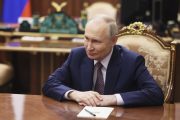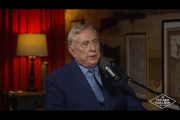
The Obama administration is intensifying its illegal secret war in Yemen as armed rebellions against the U.S.-government-backed dictatorship of Ali Abdullah Saleh (left) threaten to overthrow the regime. But while the mainstream press has been cheering on the unlawful military campaign, experts warned that it could easily backfire.
Witnesses said multiple civilians were killed in an American air strike late last week supposedly targeting suspected militants — an unavoidable consequence of jet fighter and drone attacks that will almost certainly stir up more anti-U.S. sentiment. And the secret bombing campaign has actually been stepped up in recent weeks on orders from the White House, according to military officials cited in various news reports.
What lawful or constitutional authority Obama believes he possesses to wage secret wars is unclear. Congress has not even authorized the strikes, let alone declared war. But officials claimed the purpose of the attacks was to kill militants, some of whom the government alleges could be linked to al Qaeda.
U.S. forces have also been unsuccessfully firing missiles in recent weeks supposedly aimed at an American citizen believed to be hiding in Yemen — a cleric named Anwar al-Awlaki. Despite the fact that al-Awlaki was meeting with top U.S. military officials immediately following the September 11 attacks, Obama purported to authorize the U.S.-born Imam’s extrajudicial assassination after the cleric became a suspected supporter of terrorism.
In late 2009, as The New American reported, the U.S. government began waging an intense, secret aerial-bombing campaign in Yemen, firing a barrage of cruise missiles at villages in the nation’s Northern region. “The American air force committed massacres … and used all types of military weapons to destroy villages and houses and schools and public facilities and to kill civilians,” a rag-tag band of anti-regime rebels said in a statement at the time, noting that U.S. forces were committing an “appalling massacre” with help from the Saudi Arabian dictatorship.
The U.S. administration also more than doubled direct “security” aid to the brutal Yemeni despot in 2010, not even including covert assistance, development funds and the formerly secret bombing campaigns. Incredibly, earlier this year Obama sought to increase direct military assistance from $150 million — almost half of the Pentagon’s direct annual handouts worldwide — to $250 million. Protests against the dictatorship began shortly after the proposal was made.
But despite the unprecedented amounts of American weaponry and money, the dictatorship ruling Yemen is on shaky ground and may collapse in the near future. Multiple tribes and factions have already taken up arms against the regime. Government forces continue to defect as troops loyal to Saleh have been forced to surrender vast swaths of territory to rebels. And protesters are demanding Saleh’s regime be prosecuted after handing over power for its myriad crimes.
The dictatorship has responded to the demands with brute force — murdering unknown numbers of unarmed protesters and killing even more militants. But the strategy doesn’t appear to be working.
Several top members of the ruling elite in Yemen have already been forced to flee. Saleh, who styles himself a “president” despite ruling with an iron fist for more than three decades, escaped to Saudi Arabia over the weekend after being injured in an attack on his compound in Sana’a, the capital. The Prime Minister and other top officials escaped, too, leaving the “Vice President” temporarily in charge of the regime.
American attacks will presumably continue in the meantime. U.S. diplomatic cables released by the anti-secrecy group WikiLeaks revealed that during the American bombing campaigns over a year ago, the Yemeni dictator conspired with U.S. officials to take credit for the attacks. “We’ll continue saying the bombs are ours, not yours, ” the Yemeni dictator is quoted as saying in the cable, which describes a meeting early last year between U.S. General David Petraeus and dictator Saleh.
Analysts now believe the Arab strongman was using the U.S. military to murder his political rivals, claiming the militants were “al Qaeda.” And fears continue that the various armed factions vying for power in Yemen – socialists, Islamists, tribesmen, democracy advocates and others — could transmit false information to American agents in an effort to have their opposition targeted by U.S. forces.
White House officials have waffled on the administration’s public position about Yemen. Several spokespeople including U.S. terror czar John Brennan have condemned the regime for its violent repression. An official White House statement even urged the dictator to step down.
Meanwhile, however, a spokesman for the U.S. State Department cited by the New York Times on June 8 urged the dictatorship “to seize the moment and move forward” in quashing the rebellions and assorted militants. Some experts have accused the administration of having a “non-existent” policy toward Yemen. But it is indeed unclear exactly what Obama’s official public stance is supposed to be at the moment.
The administration continues pointing to the supposed danger posed by al Qaeda in Yemen. But U.S. and international forces are still arming and training various senior leaders of the organization and its affiliates as part of the United Nations-backed campaign to oust Libyan dictator Muammar Gaddafi, another former U.S. ally in the terror war.
No matter what is really going on, however, critics say the unconstitutional American involvement in the region will end badly. Variously backing and then turning against dictators, rebels, terrorists, activists and others will not only accelerate the U.S. government’s financial ruin, it will make America less safe.




